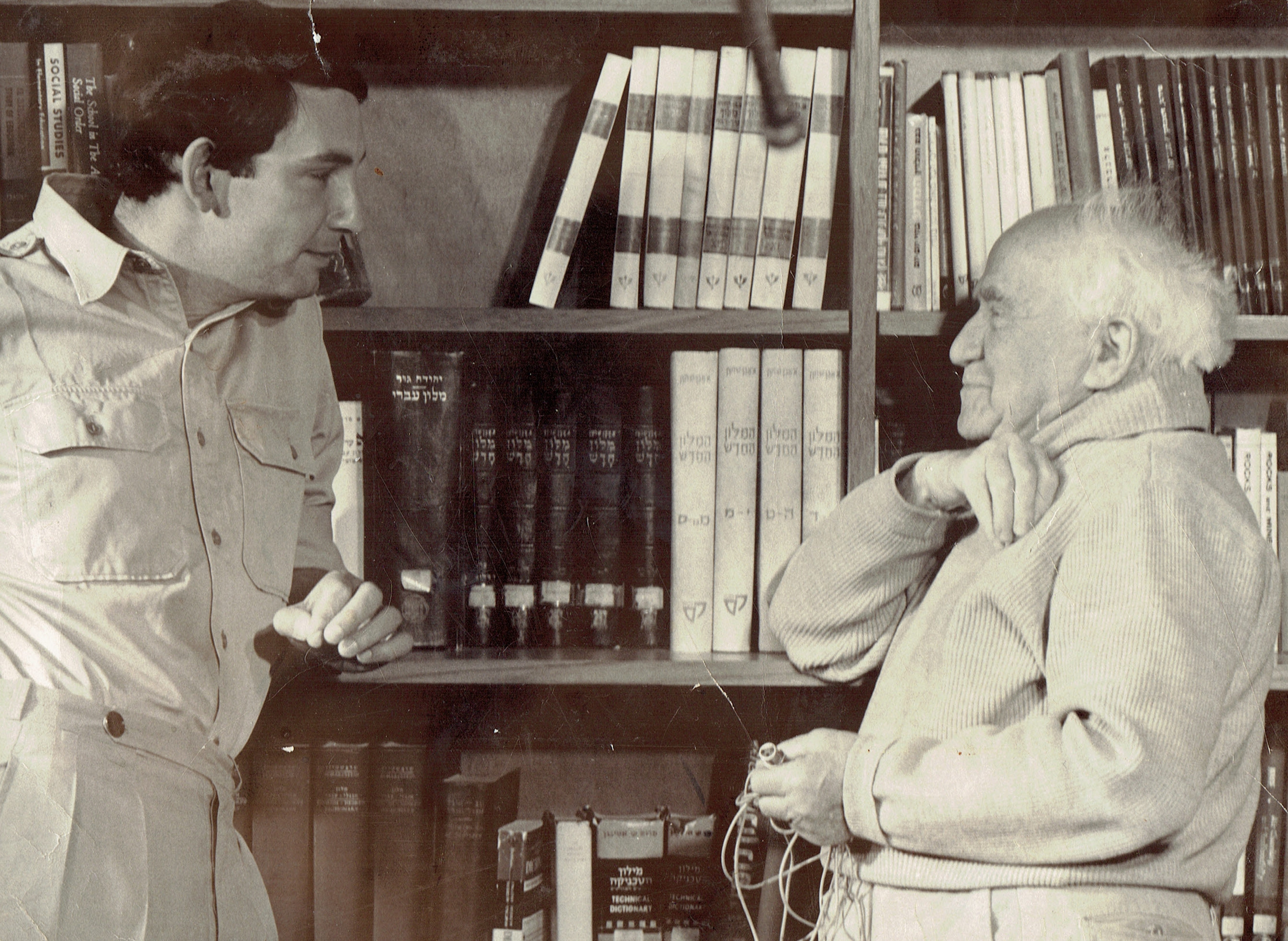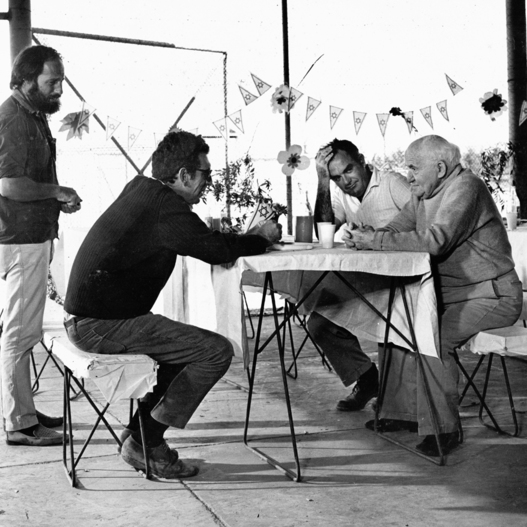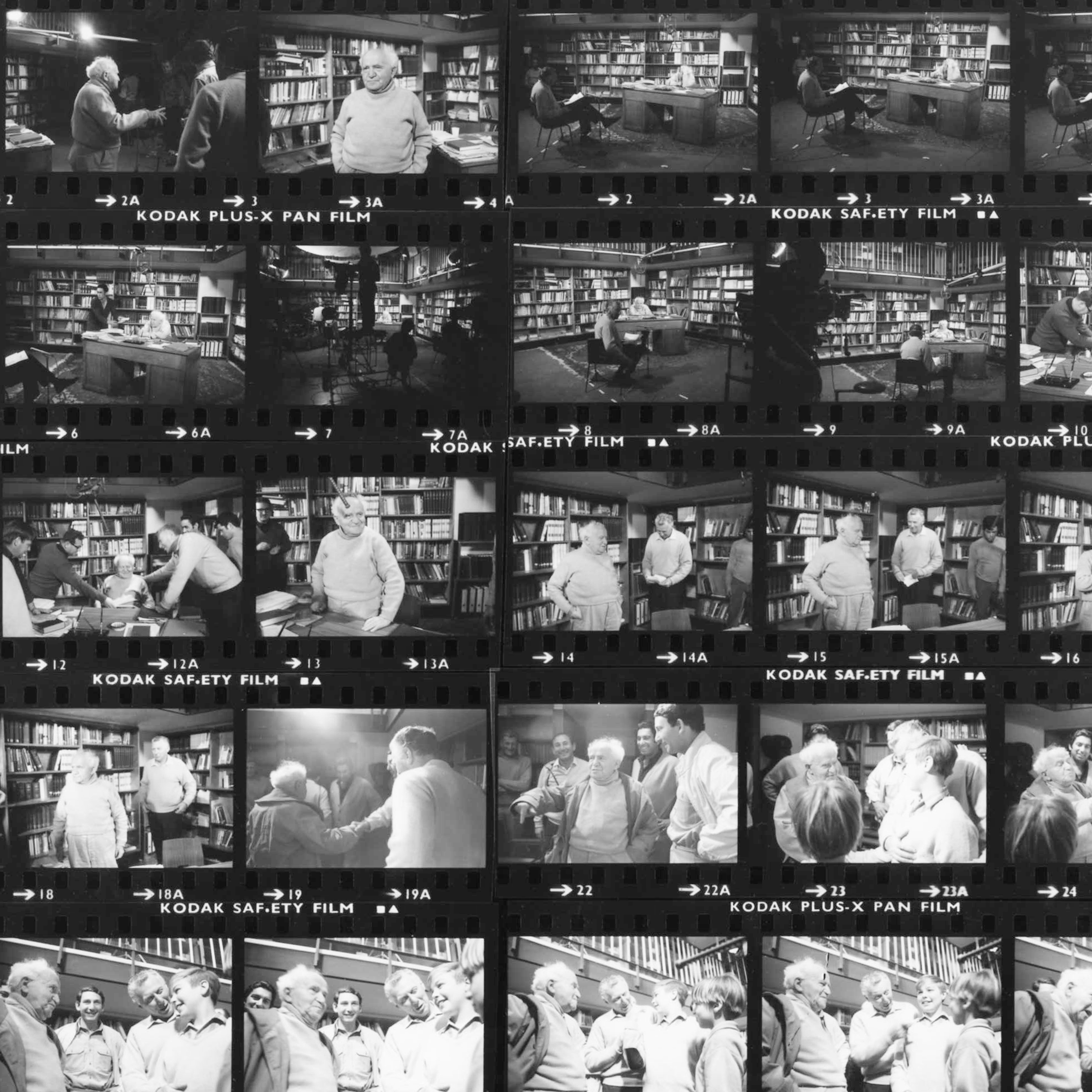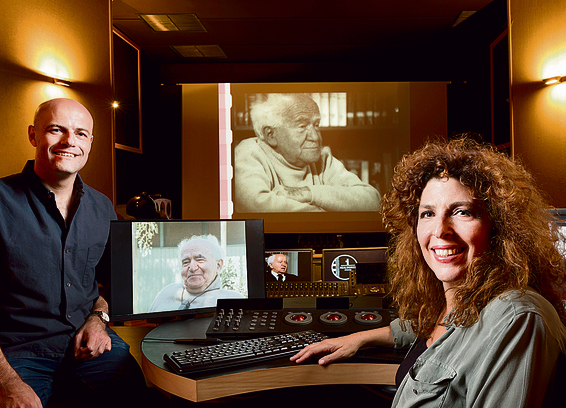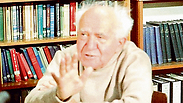
Ben-Gurion: 'Since Paula died, I've been alone, I'm half a man'
In 1968, Israel's first prime minister gave a candid interview to an Israeli-British film crew producing a documentary about his life. For almost half a century, this footage was tucked away on a dusty shelf but now these rare conversations are coming to light.
This interview, that took 48 years to see the light of day, was conducted in English over three meetings, each lasting two hours. In these conversations, which are rare in their candid nature, Ben-Gurion speaks freely about his relationship with his father, the dilemma he faced between the German reparations and the Holocaust survivors, his interest in Buddhism, his regret over the euphoria he felt after the 1956 Suez Crisis, and his relationship with his wife Paula, who died four months before the interview. He even expressed his fear over the future of the Zionist enterprise.
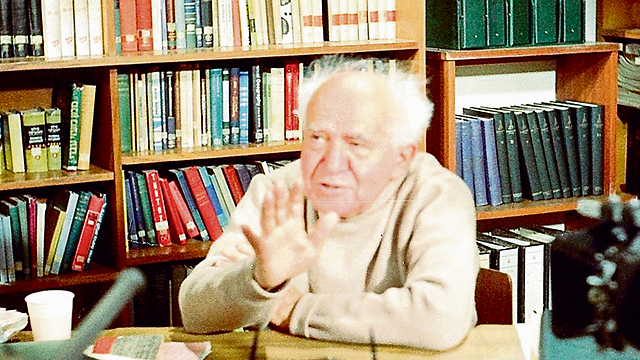
The excerpts from the interview published below are at the center of Yariv Mozer and Yael Perlov's documentary film "Ben-Gurion: Epilogue," which was screened at the Jerusalem Film Festival and will be broadcast in the coming months on Israeli television (Channel 8, HOT).
A right to this country
Mr. Ben-Gurion, what do you do with your time nowadays?
“I left the government, in 1963, for a single purpose: To write the history of the remaking of the Jewish State. Which I regard began not in May 1948, but in 1870.”
How long will that take you?
“Another six or eight years.”
Do you have faith that you will be able to do it?
“It's possible, but I'm not certain. Tomorrow there may be some accident, and I am finished. Almost every day I hear there is an accident. People are being killed.”
But, in general, you don't fear death?
“Will it help me if I do fear? Why should I fear? It will not change anything.”
What did you expect when you came to—what shall we call it, Palestine or The Land?
“Eretz Israel … There was complete anarchy in the country. One village was fighting with the other. My ideal was to work on the land. I saw every day, thousands of Arab workers, coming and going straight to work. A Jew must stand near the synagogue. The farmer came and looked at their muscles and he chose one worker. And it took me ten days until I got (my) first day of work. But, then I got malaria. At night it was terrible. I couldn't work, I couldn't eat. I wrote every week, two, three letters to my father, describing the country, so he thought I am happy. But there were many people from my town, and they were going (to Erez Israel) and coming back and they told my father how I am (really) living. When he heard that he sent me a letter: ‘Come back!’... I sent him a letter, ‘Abba...’, Abba means Father... ‘You know I will not leave this country.’”
So it strikes me that in those early years of yours you were a rebel, you were not ready to accept the normal life, the conformist life, you were against it...
“What is normal life? The normal life was abnormal life... We wanted to create a new life. Not (live) the life which exists. I believed that we had a right to this country—not taking (it) away from others, but recreating it. So when did I reach the ideal to create everything from the beginning? Only fourteen years ago.
“I once came back from Eilat (on the southern border of Israel), and suddenly I see there are some young people, a few huts. So I left my car and I went down, I said: ‘What are you doing here?’ They told me, ‘We were fighting the War of Independence in this place.’ Here I saw that that dream can become a fact. And I decided, although I was then prime minister and minister of defense, I decided to join them, to start building up, in the desert, where there is no soil, no water, no grass, no rain...
“I want to live in a place when I know that my friends, and myself—we did it. Everything. It's our creation. You see the trees which I see—I know we have planted it. The trees then speak to me in another language. I know it can be created by man. Words which are not connected with deeds are absolutely nothing.
“In our kibbutz I told them my name is David, not Ben-Gurion. So every morning I came to see what David has to do, and I went to do the work. This is what our prophets said, (that we should) serve as an example to other people. One of the greatest prophets in my view is Jeremiah. I have the feeling that what he was saying is true. And when he said: ‘God said to me,’ he heard it in his heart. He didn't talk with God, nobody can talk with God. But this was his deep feeling. And he was a great statesman. He understood politics more than the kings. But he was unpopular. A statesman who is not considering the things which ought to be done, whether it is popular or not, then he is a dangerous man.”
But you've had many decisions to make which were unpopular. At the time you decided to accept German reparations, for example. That was very unpopular.
“Of course it was unpopular. First of all, I thought that the attitude to all Germans as to Nazis is wrong. It's unjust. That's all.”
It was a very emotional problem. People had lost relatives, they'd lost family.
“Therefore with people, who were living in Auschwitz, I don't discuss this question. I know I cannot explain (this to) them. I don't expect them to understand it so with them I don't discuss it. I discuss it only with people who didn't suffer themselves. But by reason. It is not reasonable, it is unjust, it is not Jewish.
“Those who are criminals, they will suffer, but not their children. And not the fathers for their children, and this is right. Although in history it is not so. America is suffering now from the crimes of their forefathers: They brought slaves from Africa and they are paying now for it.”
Mr. Ben-Gurion...
“But this is immoral. History is not moral.”
Do you think that before the Nazi era we could have saved more Jews?
“You cannot save people who don't know what is their fate. Those who accuse the Jews that didn't defend themselves, I think it's wrong. They were powerless. Well, a million children were killed, what could the children do? More than a million mothers were killed, what could they do? They were undressed, called to stay here, and then they were killed.”
Could Winston Churchill have prevented it?
“I doubt it. You see, I can't accuse him. Churchill had one task: to defeat Hitler. Churchill was a good friend of Zionism, but he was right in thinking that the main task (at the time was) to defeat Hitler. But they could have saved many Jews. They were asked to bomb Auschwitz, Treblinka, they could do it. They didn't do it.”
Many Jews think of Israel as a place of refuge for unfortunate Jews. Why should the Jews come back to Zion?
“We had a great Jew. It's about 3,300 years ago. He was the greatest Jew we ever had. His name was Moshe. He said: You are the smallest of the nations and you must be an Am Segula.”
'Am Sgula' could be translated as 'a nation of higher virtues'?
“This is one of the meanings. The virtues which we were asked by our prophets, was to be just, truthful, helping all those who need help, and love other men like yourself.”
Do you think Israel is carrying out that mission?
“Not yet.”
When you were head of the movement and were prime minister of this country, did you also tell the people, or try to, tell the people to be an 'Am Sgula'?
“As long as the (1948) war was going on, I thought security is our main business. When the war was over, at the beginning of January 1949, I called together our best men... Buber... (philosopher) Hugo Bergmann... and others. And I said to them: While until now, we had to fight, which is against our belief and our faith, but destiny imposed it on us. And unless we keep increasing spiritual superiority, I doubt whether we will be able to achieve what we ought to achieve. And therefore we need you.”
Everything for security
At this point of the interview, the questions become more personal, and Ben-Gurion candidly talks about life after losing the love of his life.
Your life must have changed considerably since your wife passed away. Yet you go on working, you're not a crushed man.
“A crushed man? No. Why should I be crushed?”
Many people are crushed by loss.
“I don't feel now what I felt even four months ago, but I can't help it. I didn't expect that, I was certain that I will die before her. But fate decided otherwise. This cannot be changed.”
I read many of the letters that you wrote to Paula in the early years of your marriage, they reveal a great love, a great tenderness.
“She was a remarkable woman. She was not a Zionist, she had very little Jewish feeling, she was an American, she was an anarchist. At that time, all the progressive youth were anarchists. And her hero was an anarchist woman, (Emma) Goldman. This was the greatest (person) she knew. She had no interest in Israel, she didn't know what for. ‘America is better, why do we need the land of Israel?’ But when we decided to marry each other I told her, ‘you will have to go to Israel,’ and I told her what Israel is, then. And she agreed. And so in November 1919 she came to Israel with the child.
“Then, suddenly, 15 years ago, I told her: ‘I'm going to the desert.’ She thought I am mad that I am resigning (from) the government and going to live in the desert, but she followed me. Not many women would do that. So she was very much devoted, and this is a great thing. And now I am alone but I can't help it. I'm now a half-man but I must do what I can.”
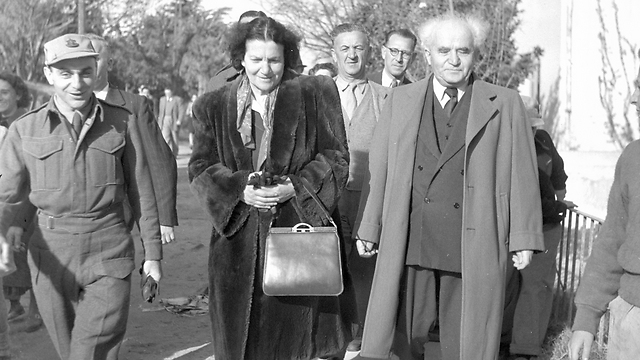
The prophets in the Bible had a vision for the future, and they connected that vision with the faith in God. They needed strength and they turned to God. Do you also turn to God when you need strength?
“Are you sure that they turned to God? What do you mean by saying turning to God? Does God live in some place and you turn to him?”
They could pray to God...
“God is everywhere. Turning to God is thinking deeply about something. They turn to God..? They take his address and go there? Well, the Rambam said: ‘God doesn't talk.’ He's not a human being.”
Do you think there is a lot of room in Judaism for meditation? Is meditation a theme in Judaism?
“Well, I'm afraid now you use the word meditation in the Buddhistic sense. Meditation is not that meaning which you now apply to it.”
Do you find that meditation is helpful?
“No... Well, there is meditation and there is thinking. Thinking I think is helpful.”
Buddha also believed in the non-self, Anatta.
“His teaching was a teaching of love, human love. He said: Hatred doesn't cease through hatred, only by love. This is in Dhammapada, they said. And this was said 500 years before Christ. And this also what you find in the Torah. Very deep, old human morality. ‘You shall love your fellow man as yourself.’
“So (the way) the German teachers of the Bible interpret it, it (applies) only (to) Jews. But they forgot that in the same chapter, Chapter 19 (in) Leviticus, it said a little later: ‘If a stranger will live among you … he should be to you like a citizen and you should love him like yourself because you were strangers in Egypt.’ So it doesn't mean only Jews.”
Do you think Israel is going to have to fight the Arabs again? And if so, can we win?
“Maybe they (would) have to fight again. Even several times, but I wouldn't say that they must fight again. For instance, take the prophecy: ‘Nation will no longer fight against nation, nor learn war any more.’ They shouldn't learn war any more. They shouldn't spend their money and their time and their people, their young men, preparing for war.
But if a country has to defend itself, as in the War of Independence?
“I think this is the unique case in the history of the world, certainly in our time, that a new state, in the same day when it was proclaimed, when it became a state, was attacked by all the neighbors. I don't know of any other case. Of course this compelled us to give our best youth, and our best brains, for security.”
There were those, the United States for example, which counseled a delay of the declaration of independence, yet you went ahead with it. And when a person has to make big decisions involving countries, lives, there must always be the fear of making mistakes. How do you get over the fear?
“You can never know if you are not making a mistake. Because if you know you are making a mistake, you don't make it. You do something because you think it's right. And I never assumed that, no, I can't make a mistake. But from what I could understand, I thought it ought to be done. But there were several things, which the government didn't accept, and the majority is ruling. But most occasions they accepted it.”
You know that most of the countries that have been established since WWII have failed at democracy. Can Israel's democracy survive?
“I hope it will. And sometimes democracy can make mistakes, but it's better to make a mistake in democracy, than (adopt another perception).”
When you are here, do you miss some of the people that you've been associated with for many years who are now politically alienated from you?
“Well, who?”
Moshe Dayan, Golda Meir... Do you miss them? People that you were accustomed to see.
“I don't miss them, I am sorry that they are not doing the right thing. They are very nice (people), I like them. And I am sorry they are doing certain things which they shouldn't have done. But all right, perhaps everybody... I'm afraid I also did certain things which I shouldn't have done. I know one speech which I have made in the Parliament, now I wouldn't make it.”
You wouldn't make it?
“No. Immediately after the war... the (1956) Sinai Campaign was over. I was so... In seven days they took the whole Sinai. I thought it's impossible. The area of Sinai is at least five times as big as the whole of Israel. So I got a little drunk with that victory and I said a little too much which I wouldn't say now. I went too far. Some of the government thought that I want to have Sinai as a part of Israel. And I was asked this question: ‘Will you annex Sinai if you (capture) it?’ I said: ‘No. Our intention is to go to Sinai to ensure freedom of navigation in Eilat.’ Let us not forget what happened this last year, the Six-Day War.”
When you think of your own contribution to the fulfillment of the reestablishment of the state, what are the main areas of your contribution?
“If I would be alone, I would be able to do nothing.”
Pardon me?
“I alone wouldn't (have been) able to do anything. It's such a matter which doesn't depend on a single person. This is the mistake in general. There are many historians which say: Oh, this was done by that leader and by that leader... I don't believe it.
“There are things which been done by a single man, for instance, the theory of relativity. This was created by Einstein. Although when I spoke with Einstein, I read in his biography that Einstein was the only scientist which from pure thinking came to certain new ideas about science. I asked him: ‘Is it true?’ He said: ‘It's partly true.’ I myself didn't (do) all (of) those experiments, but I knew the experiment(s) which others (have done), and I drew from them certain conclusions. But without those experiments I wouldn't be able to reach my theory.
“But in history, I don't believe that a single person can change things. Unless it is done by the people or by a part of the people, it can't be done. And if we (didn’t) have the pioneers of the first generation, we wouldn't (have been) able to do that.”
But you can't deny that you had a role?
“Of course, I was appointed prime minister, so I had to do something.”
And you've guided Israel well?
“I didn't guide Israel, I guided myself. I never guided Israel.”
Do you fear for your country?
“Oh, I always feared. Not only now. (This) state does not yet exist. It's only the beginning.”










